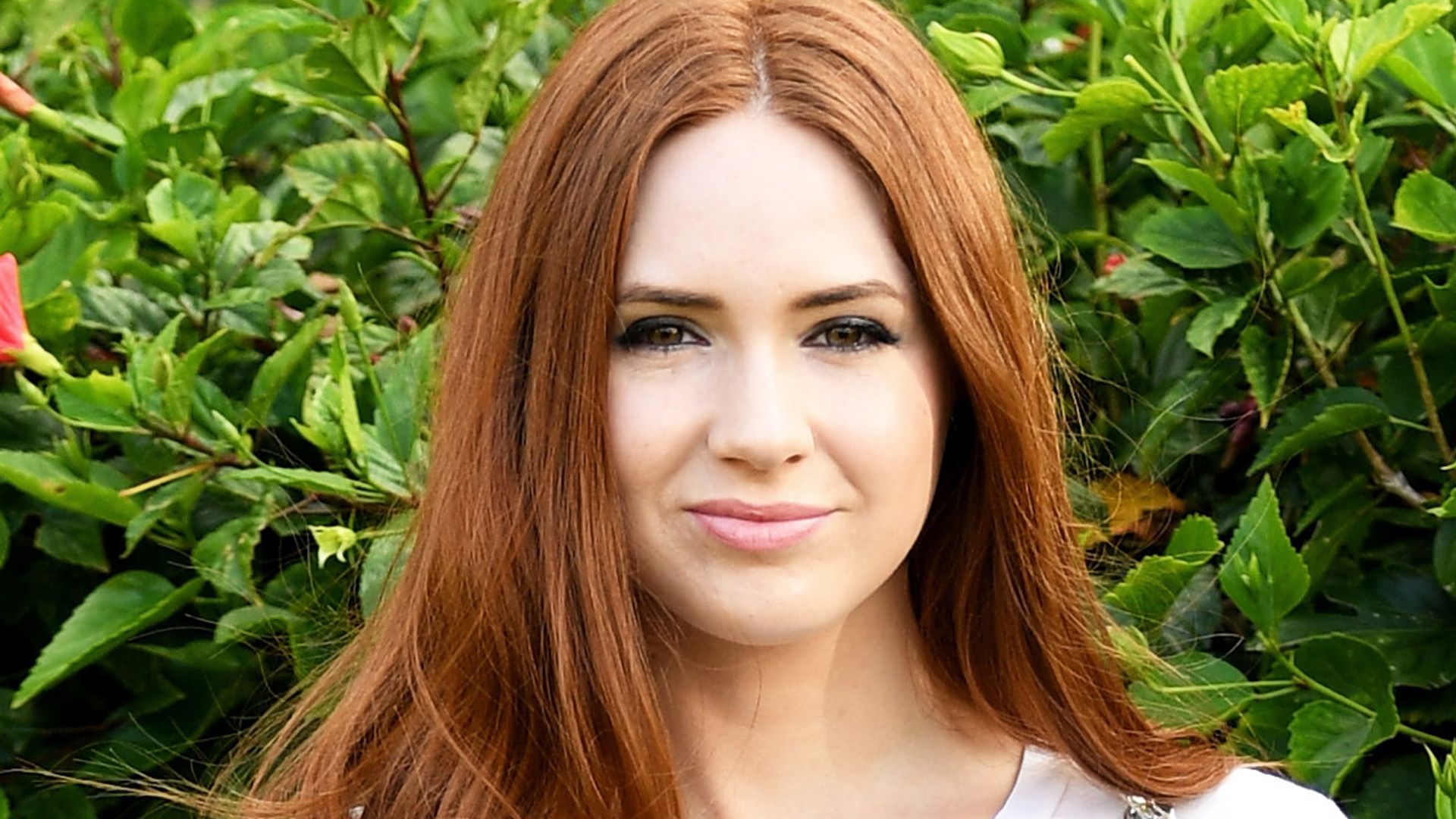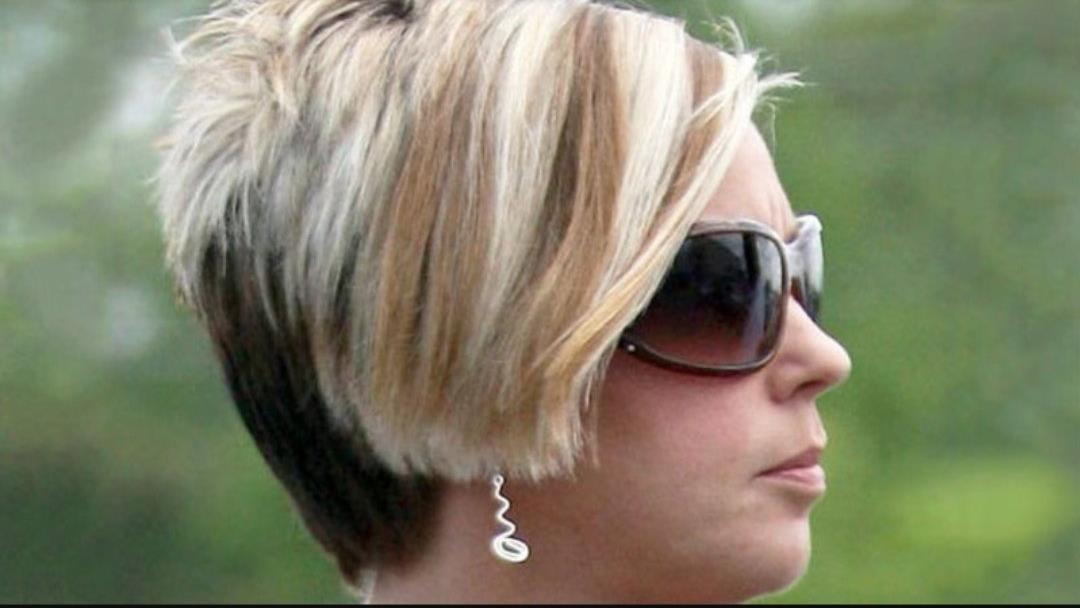Karen Backfisch Olufsen: Unpacking A Modern Cultural Reference
Have you ever stopped to think about how certain names just sort of take on a whole new meaning in our everyday conversations? It's really quite fascinating, you know, how a simple given name can become a widespread cultural shorthand for a specific kind of person or behavior. This is very much the case with the name 'Karen,' which, as a matter of fact, has truly embedded itself into our collective awareness as a way to describe a certain type of individual. We're going to explore what that all means, especially when we consider a phrase like "karen backfisch olufsen," which might, in a way, bring together different aspects of this intriguing cultural phenomenon.
For quite some time now, the name 'Karen' has become, well, synonymous with a particular kind of angry woman, often, you know, older, and quite frequently, a white American woman. It's a descriptor that has really stuck, and it's something many people recognize instantly. But where did this whole association begin, and what exactly made it so popular, you might wonder? It's a question that, in some respects, gets at the heart of how internet culture and social commentary often mix.
We'll unpack the meaning behind this widely shared meme, looking at its origins, what it truly means, and how people use it in various ways. You'll get to see how it connects to some rather serious societal discussions, and also how it has evolved into some pretty funny online variations that, you know, keep the memes fresh and quite amusing. So, let's just get into it and figure out what all the fuss is about, particularly when we think about the idea of a "karen backfisch olufsen."
- Is Ben Chan Gay
- Kate Walsh Eye Color
- Im Not Acrobatic Lil Baby
- Thomas Jaraczeski Verdict
- Korra Obidi Net Worth
Table of Contents
- The Origin Story of the 'Karen' Meme
- Karen Jackson: A Fictional Perspective
- Personal Details of Karen Jackson (Shameless)
- The 'Karen' Archetype and Societal Reflections
- What Might 'Karen Backfisch Olufsen' Imply?
- Understanding the Meme in Daily Talk
- Frequently Asked Questions About the 'Karen' Meme
The Origin Story of the 'Karen' Meme
The name 'Karen' as a humorous, generic name for a woman has, you know, been around for a while, perhaps even dating back to the early 2000s. There's evidence of its use to, like, gently mock middle-aged women from that time. One source often brought up is the comedian Dane Cook. Back in 2005, he had a comedy bit where he joked about that one friend in every group that, you know, nobody really likes, and he used the name Karen for that character. It's a pretty memorable routine, actually, and it might have, in a way, helped plant the seed for the later widespread use of the name.
Over time, the meme really took off, and it became much more specific. It began to represent a woman who, quite often, demands to speak to the manager, or someone who displays a sense of entitlement. This is that person who, perhaps, might just complain about seemingly small things or, you know, assert their perceived authority in public spaces. The meme gained a lot of traction, especially with photos and videos of real-life situations that seemed to fit the description perfectly. You know, like the situation with Patricia and Mark McCloskey, who were, apparently, dubbed 'Karen' and 'Ken' after pictures came out of them, you know, pointing firearms at people. It just goes to show how quickly these labels can stick.
So, the meaning behind the 'Karen' meme is, more or less, rooted in these kinds of public displays. It's about a specific type of behavior, often perceived as overbearing or privileged, that gets called out. This viral name has truly, you know, become a shorthand for these sorts of interactions. It's pretty interesting how a name can evolve like that, isn't it? It's like, you know, a snapshot of social commentary in action.
- How Many Kids Do Lil Baby Have
- Frank Fritz Mike Wolfe House
- Naomi Scott Ethnicity
- Casper Smart Net Worth
- Kevin Dias Age
Karen Jackson: A Fictional Perspective
When people talk about 'Karen' in popular culture, especially in a more nuanced way, they sometimes, perhaps, think of Karen Jackson from the show "Shameless." This character, in a way, offers a really complex portrayal that goes beyond the simple meme. Her family, at least on the surface, seemed, you know, the most normal in the show. You had a civil servant father, a seemingly virtuous mother, and Karen herself, who was, you know, a high-achieving, obedient daughter. But, as a matter of fact, things were far from normal.
As the story unfolds, you start to uncover some rather unsettling truths. Her father, for example, had a strange fascination with clowns, and her mother was, you know, into S&M. Karen herself, it turned out, struggled with a sex addiction. It's a pretty dark picture, and it makes you wonder about the kind of influence her family life had on her. This character really showed, you know, how appearances can be deceiving, and how complex people can actually be underneath it all.
The relationship between Karen and Lip, another character on the show, was, you know, pretty intense and often quite heartbreaking. There were so many ups and downs for them. Like, after Lip left, he found out about a bunch of things, and he confronted Karen right at her doorstep. He even, you know, tried to hit Frank, and then Karen's dad, tragically, took his own life. It was a lot to take in. Lip, being the calm person he often was, went to find her, and with the song "Long Time" by Cake playing, they, more or less, found a quiet way to, you know, reconcile at the end of the first season. Their story, you know, was always a bit of a roller coaster, and it left many viewers feeling a sense of deep sadness for Lip.
Later on, in the second season, people really wondered about the deep-seated animosity between Karen and her father. Their relationship was, honestly, quite fraught with tension, and many aspects of their family life, beyond the purity ball incident, were never fully explained. It left a lot of viewers, you know, with lingering questions about what truly drove their conflict. Karen, despite her often wild behavior, had a very sympathetic side, and her story, you know, was quite tragic in many respects.
Her appearance on the show was, in a way, quite striking. Many people found her to be a truly beautiful white girl, especially when she smiled. It was, you know, very captivating. There's a scene in the first season where Lip and Ian are tutoring her, and she famously says, "Science makes me horny," which, you know, got a lot of laughs. It just goes to show her unique personality. The actress who played Karen was, apparently, 26 years old when she took on the role, and she got it, you know, partly because she had such a youthful face, almost like a doll's face, which really suited the character.
Personal Details of Karen Jackson (Shameless)
It's worth noting that Karen Jackson is a fictional character from the television series "Shameless." Her story, you know, is part of a narrative created for entertainment, but it does, in a way, reflect on some very real human struggles. Here are some details about her portrayal:
| Detail | Description (as portrayed in "Shameless") |
|---|---|
| Name | Karen Jackson |
| Family Dynamics | Appeared outwardly normal; father had a clown obsession, mother into S&M. |
| Personal Struggles | Struggled with sex addiction. |
| Key Relationships | Complex and often painful relationship with Lip Gallagher. |
| Key Events | Involved in purity ball, father's suicide, and tumultuous on-again, off-again relationship with Lip. |
| Personality Traits | Often portrayed as rebellious, sexually promiscuous, but also vulnerable and deeply troubled. |
| Appearance | Described as a beautiful white girl with a captivating smile. Actress had a youthful, "doll-like" face. |
| Academic Performance | Initially portrayed as a high-achieving student. |
The 'Karen' Archetype and Societal Reflections
The 'Karen' meme, beyond just being a funny internet joke, has actually, you know, sparked some pretty serious discussions about social dynamics. Contemporary 'Karens' have, for instance, been compared to figures like Carolyn Bryant, who was, you know, the white woman Emmett Till was accused of offending, which, tragically, led to his lynching. In literature, the 'Karen' archetype has also been likened to Mayella Ewell, a fictional character from "To Kill a Mockingbird." These comparisons, you know, highlight how the meme can, in a way, touch upon themes of racial privilege and the weaponization of perceived victimhood.
It's a rather stark reminder that while the meme can be humorous, it also, you know, points to deeper societal issues. The angry, often older, often white American woman demanding her way, or, you know, making a scene, has become a symbol. This symbol, apparently, represents a kind of privilege that can be quite harmful when exercised without consideration for others. It's a pretty powerful concept, actually, and it shows how memes can, in a way, hold a mirror up to society, reflecting our biases and, you know, our ongoing struggles with fairness.
The discussion around 'Karen' also brings up questions about who gets to define what's acceptable behavior. It's like, you know, a way for people to call out what they see as entitled actions, especially when those actions seem to come from a place of social advantage. The meme, in some respects, has become a tool for social commentary, allowing people to express frustration with certain types of public conduct. It's pretty clear that this isn't just about a name; it's about, you know, a whole set of behaviors that many people find problematic.
What Might 'Karen Backfisch Olufsen' Imply?
Now, let's consider the full phrase: "karen backfisch olufsen." This combination, you know, isn't something directly found in the origins of the 'Karen' meme, but it does, in a way, offer a chance to playfully think about how the 'Karen' archetype might evolve or be described in more specific, perhaps even humorous, terms. 'Backfisch' is, you know, a German term that typically refers to a teenage girl, often implying a certain spiritedness or a cheeky, perhaps a little bit immature, nature. And 'Olufsen,' well, that sounds very much like 'Bang & Olufsen,' which is, you know, a high-end Danish audio brand known for its rather sleek design and premium quality. So, what happens when we put these ideas together with 'Karen'?
A "Karen Backfisch Olufsen" might, perhaps, be imagined as a 'Karen' who is, you know, younger, maybe still in her teenage years or early twenties, but who already exhibits some of those 'Karen' traits. She might be, you know, spirited and a bit cheeky, as the 'Backfisch' part suggests, but also, perhaps, very particular about her possessions, especially her high-quality audio equipment, as the 'Olufsen' part might imply. She could be the kind of young person who, you know, insists on the best sound quality for her TikToks, or who, perhaps, demands that her parents buy her the latest premium gadgets. It's a pretty funny image, actually, and it just goes to show how adaptable these cultural labels can be.
This phrase, in some respects, allows us to, like, explore different facets of the 'Karen' phenomenon. It suggests that the 'Karen' behavior isn't just limited to older, white women, but could, you know, manifest in different age groups or even in different cultural contexts. The 'Backfisch' element adds a touch of youthful energy, while 'Olufsen' might hint at a certain consumer profile or a demand for perfection in, you know, everyday items. It's a way of saying that 'Karen' behaviors, perhaps, are more widespread than we sometimes think, and they can, you know, appear in rather unexpected places. It's pretty interesting to consider, isn't it?
So, when you hear "karen backfisch olufsen," it's not, you know, about a specific person, but more about a playful way to describe a particular kind of 'Karen' who might be, you know, a bit younger, perhaps a little spirited, and maybe, just maybe, very particular about her premium headphones. It just goes to show how creative people can get with language and memes in our current, you know, online world. It's a pretty clever way to, like, add new layers to an already well-known concept.
Understanding the Meme in Daily Talk
Understanding what a 'Karen' is in slang, its origins, and how to use it, really helps you, you know, keep up with hilarious online variations that, apparently, keep memes fresh and funny. It's not just about pointing fingers; it's also about, you know, recognizing patterns of behavior that are often seen as problematic in public spaces. The meme has, in a way, become a shorthand for these moments, allowing people to quickly communicate a complex idea with just one name. It's pretty efficient, actually.
If you've ever wondered about the true meaning behind the 'Karen' meme, we've, you know, broken it down for you. It's about more than just a name; it's about a cultural phenomenon that reflects societal tensions and, you know, shifts in how we perceive public conduct. The meme, in some respects, has given a voice to those who feel marginalized or, you know, put upon by entitled behavior. It's a powerful tool for commentary, and it's something that, apparently, continues to evolve as new situations arise. You know, like, what else could be added to the 'Karen' archetype next?
It's also, you know, important to remember that while the meme can be funny, it also has a serious side. It's a way of, like, calling out behavior that can be quite harmful, especially when it involves privilege or discrimination. The comparisons to historical figures like Carolyn Bryant really, you know, drive home the point that this isn't just lighthearted fun. It's a reflection of ongoing social issues that, you know, people are trying to address. So, when you use the term, it's pretty good to be aware of its full weight.
The evolution of the 'Karen' meme shows how internet culture can, in a way, quickly adapt and reflect current events. From its early uses to mock middle-aged women to its more specific association with entitled behavior, the meme has, you know, truly become a part of our modern lexicon. It's pretty clear that it's not going anywhere soon, and it will likely, you know, continue to evolve as society changes. It's a fascinating example of how language and humor can, apparently, intertwine to create powerful cultural symbols.
Frequently Asked Questions About the 'Karen' Meme
What exactly is a 'Karen' and where did the meme come from?
A 'Karen' is, you know, a slang term that describes a type of angry, often older, and quite frequently, white American woman who is perceived as entitled or demanding. She might, for example, often insist on speaking to a manager or, you know, display a sense of privilege in public situations. The meme's origin can be traced back to at least the early 2000s, with some sources pointing to comedian Dane Cook's 2005 comedy routine. It really, you know, gained popularity through viral videos and photos of real-life incidents that seemed to fit the description, like the McCloskey incident.
Is the term 'Karen' always negative?
While the term 'Karen' is typically used to, you know, criticize or mock certain behaviors, its impact can vary. It's often used humorously in online variations to keep memes fresh and funny. However, it also, you know, carries a serious side, as it's used to call out instances of perceived privilege, entitlement, or even racism. Comparisons to historical figures like Carolyn Bryant show that the term can, in a way, highlight significant societal issues. So, it's pretty much a mix, you know, depending on the context.
How has the 'Karen' meme evolved over time?
The 'Karen' meme has, you know, definitely evolved from a generic name for an annoying woman to a more specific archetype representing entitlement and demanding behavior, often associated with, you know, middle-aged white women. It gained significant traction with specific viral incidents. The meme also, apparently, continues to evolve, with new variations and discussions emerging. The concept of "karen backfisch olufsen" is, in a way, a playful example of how the core idea can be, you know, adapted and given new descriptive layers, perhaps hinting at younger or more specific types of 'Karens.' It's pretty dynamic, actually.
To learn more about internet culture and memes on our site, and link to this page for more insights into viral phenomena.
For more general information on how cultural terms spread, you might, you know, look into linguistic studies of slang. One helpful resource could be a university linguistics department's publications, like those from Oxford University's research on language and linguistics, which often covers how language changes and adapts in society.
- Chris Hemsworth Religion
- Are Mike Wolf And Danielle Coby Married In American Pickers
- Daniel Craig First Wife
- Courtney Nikkiah Haywood
- Jackie Love Is Blind Trans

What Is a Karen? The Slang Definition - Parade

Karen Gillan Wedding: A Celebration Of Love And Glamour

Karen, le nouveau nom de toutes les empêcheuses de tourner en rond